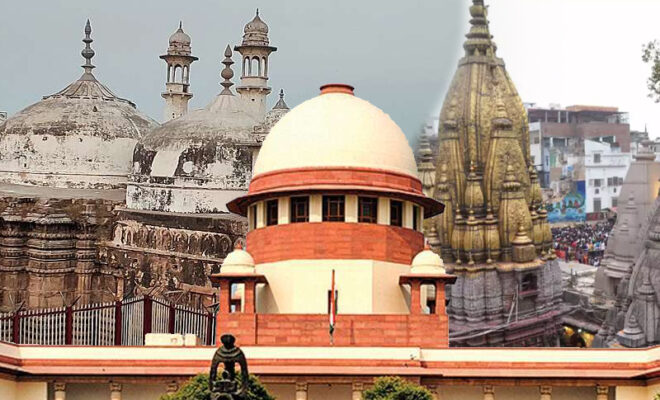Court To Finalize Today – ‘Gyanvapi Mandir’ or ‘Gyanvapi Masjid’

The court is going to make its final verdict today on the long awaited Gyanvapi Masjid case. The survey team had already found a ‘Shivling’ inside the complex.
Varanasi increased security and enacted prohibitory orders under Section 144 in preparation for Monday’s district court decision on the suit’s maintainability in the Gyanvapi mosque-Shringar Gauri case.
The order in the sensitive social issue had been reserved by District Judge A K Vishvesh until September 12.
A petition was submitted by five women asking for permission to worship Hindu deities every day.
These deities are believed to have idols that are stated to be on the exterior wall of the nearby Gyanvapi mosque.
A Varanasi court then mandated the survey of the mosque complex. After the investigation, it was asserted that a “Shivling” had been discovered in the mosque’s grounds.
The Anjuman Intezamia Masjid Committee, meanwhile, asserted that the Gyanvapi mosque is a Waqf property and questioned whether the argument could be sustained.
A lawyer for the Hindu side named Madan Mohan Yadav claimed that the mosque was built after the temple was destroyed.
What does the petitioner argue?
The petitioner claims that the mosque complex contains a so-called Jyotirling of Lord Vishwanath in Kashi (Varanasi).
The petitioner further asserted that Mughal Emperor Aurangzeb erected the Gyanvapi Mosque in 1669 while demolishing a part of the Kashi Vishwanath temple.
The petitioner requests that the court rule that Muslims do not have the right to possess the Gyanvapi mosque and to forbid their admission.
What has the defense said?
The mosque has been there from the beginning, the defense claims, and there was no temple in the Gyanvapi complex.
However it is ironic that the name ‘Gyanvyapi’ is itself a Hindu name. There is no such name used for any mosque anywhere in the world.
What has the Supreme Court said?
On July 21, the Supreme Court stated that it will wait for the Varanasi district court to rule on the application from the Gyanvapi mosque committee.
The conclusion of the hearings before the district court was then reported to the SC bench, who subsequently scheduled the subject for another hearing in the first week of October.
On May 20, the Supreme Court shifted the civil case brought by Hindu devotees in the Gyanvapi matter from the civil judge (senior division) to the district judge of Varanasi.
The SC stated that it is preferable if a senior judicial officer with expertise of over 25–30 years handles this matter due to the “complexities” and “sensitivity” of the subject.
The Places of Worship Act of 1991 does not prohibit the process of determining a place of worship’s religious character, according to the supreme court.
This occurred following the May 19 report submission by the committee that had been established by a district court to undertake a video survey of the Kashi Vishwanath temple-Gyanvapi Mosque complex.
The highest court had earlier ordered on May 17 that the place where the Shivling was purportedly discovered in the mosque must be protected. The SC also permitted Muslims to pray inside the mosque until the lawsuit’s maintainability was decided.


